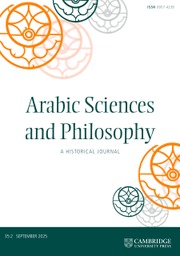No CrossRef data available.
Article contents
Response*
Published online by Cambridge University Press: 24 October 2008
Extract
Herbert Davidson's critique of my thesis regarding the relation between Averroes' Middle and Long commentaries on De anima contrasts my reading and translation of Middle Commentary passages with his own. I leave it to the informed reader to judge whether one translation is more “neutral” than the other, excluding the specific denotation which I give to sharh, which is the point at issue.
- Type
- Research Article
- Information
- Copyright
- Copyright © Cambridge University Press 1997
References
1 The two translations seem to me rather close in general. I would question Davidson's rendering of jawhar as referring to “self” rather than the customary “substance” in the third example which Davidson cites, and see his note 19; and his translation of fasl as “issue” rather than “chapter” in the first example. As concerns faslGoogle Scholar, cf. my article “Averroes' Middle and Long Commentaries on the De anima,” Arabic Sciences and Philosophy, 5 (1995): 75–92, p. 86.CrossRefGoogle Scholar
2 Ibid., p. 84, note 37.
3 Cf. Davidson's, understanding of Averroes' reference to Themistius in the Middle Commentary, in his article, note 18.Google Scholar
4 Annotated English translations of both works are nearing completion, that of the Long Commentary by Taylor, Richard, and mine of the Middle Commentary.Google Scholar


